Quantitative Research on Mental Health During the COVID-19 Pandemic
VerifiedAdded on 2023/06/15
|10
|2764
|254
Report
AI Summary
This report investigates the impact of the COVID-19 pandemic on mental health using quantitative research methods. The study employs simple random sampling with 20 respondents to gather data on their experiences during the pandemic. The findings indicate that while many respondents reported managing anxiety by staying connected with others, a significant portion did not feel supported by authorities. The research also explores the relationship between age, employment status, and mental health, revealing insights into how different demographics coped with the challenges of the pandemic. The report concludes that mental health is a critical aspect of overall well-being, especially during times of crisis, and emphasizes the importance of addressing mental health challenges alongside physical health concerns. Desklib provides this report as a resource for students, offering access to solved assignments and past papers.
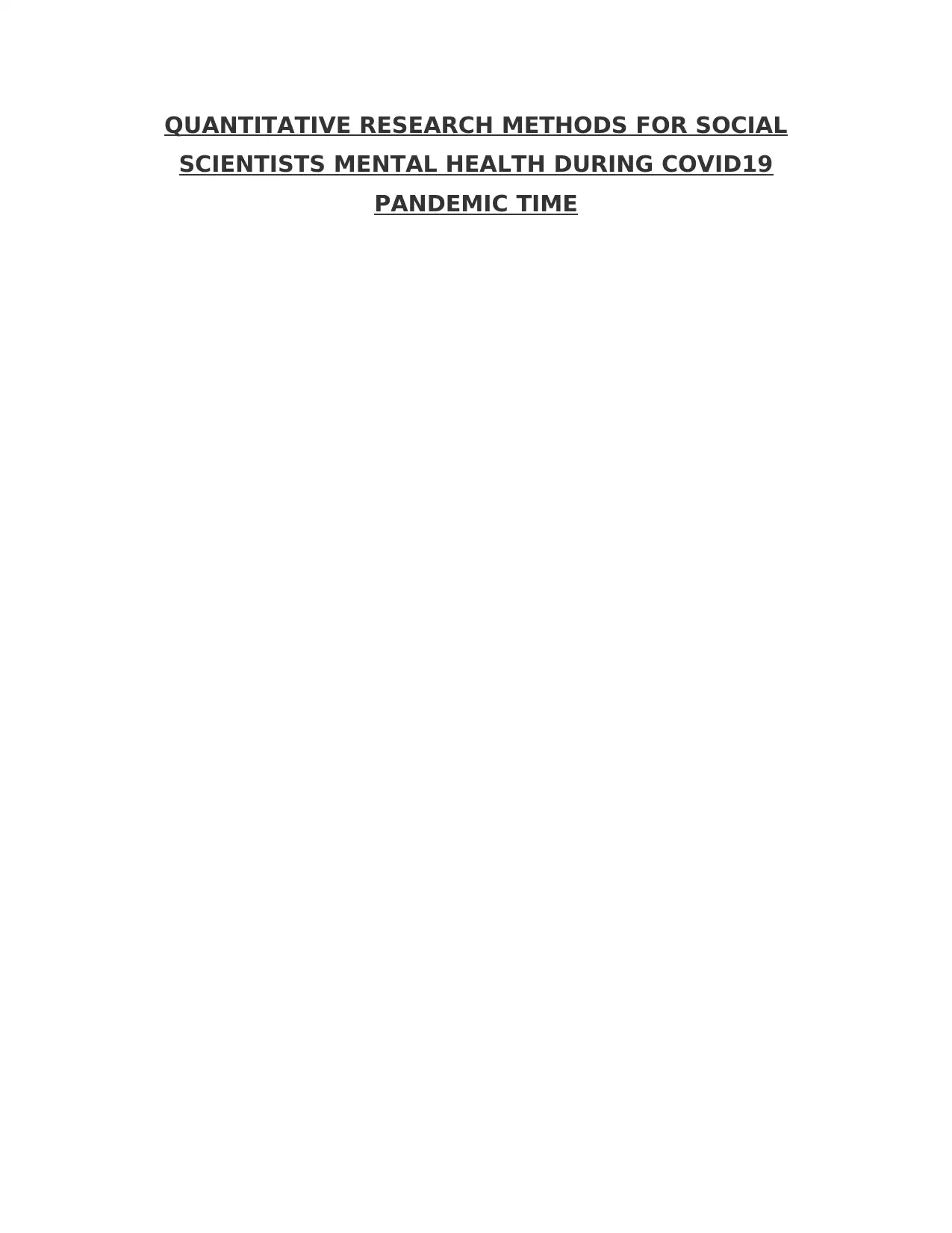
QUANTITATIVE RESEARCH METHODS FOR SOCIAL
SCIENTISTS MENTAL HEALTH DURING COVID19
PANDEMIC TIME
SCIENTISTS MENTAL HEALTH DURING COVID19
PANDEMIC TIME
Paraphrase This Document
Need a fresh take? Get an instant paraphrase of this document with our AI Paraphraser
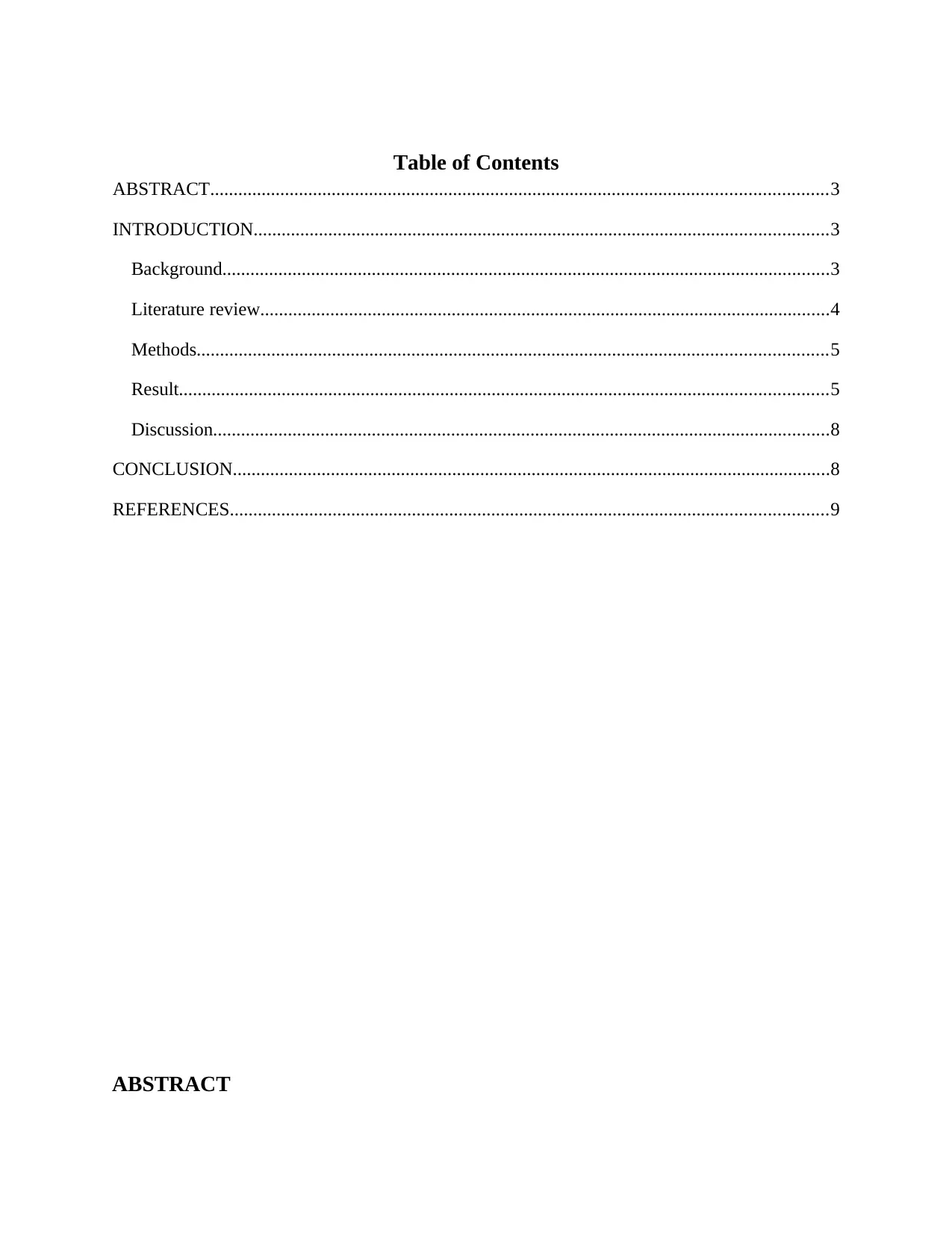
Table of Contents
ABSTRACT....................................................................................................................................3
INTRODUCTION...........................................................................................................................3
Background..................................................................................................................................3
Literature review..........................................................................................................................4
Methods.......................................................................................................................................5
Result...........................................................................................................................................5
Discussion....................................................................................................................................8
CONCLUSION................................................................................................................................8
REFERENCES................................................................................................................................9
ABSTRACT
ABSTRACT....................................................................................................................................3
INTRODUCTION...........................................................................................................................3
Background..................................................................................................................................3
Literature review..........................................................................................................................4
Methods.......................................................................................................................................5
Result...........................................................................................................................................5
Discussion....................................................................................................................................8
CONCLUSION................................................................................................................................8
REFERENCES................................................................................................................................9
ABSTRACT
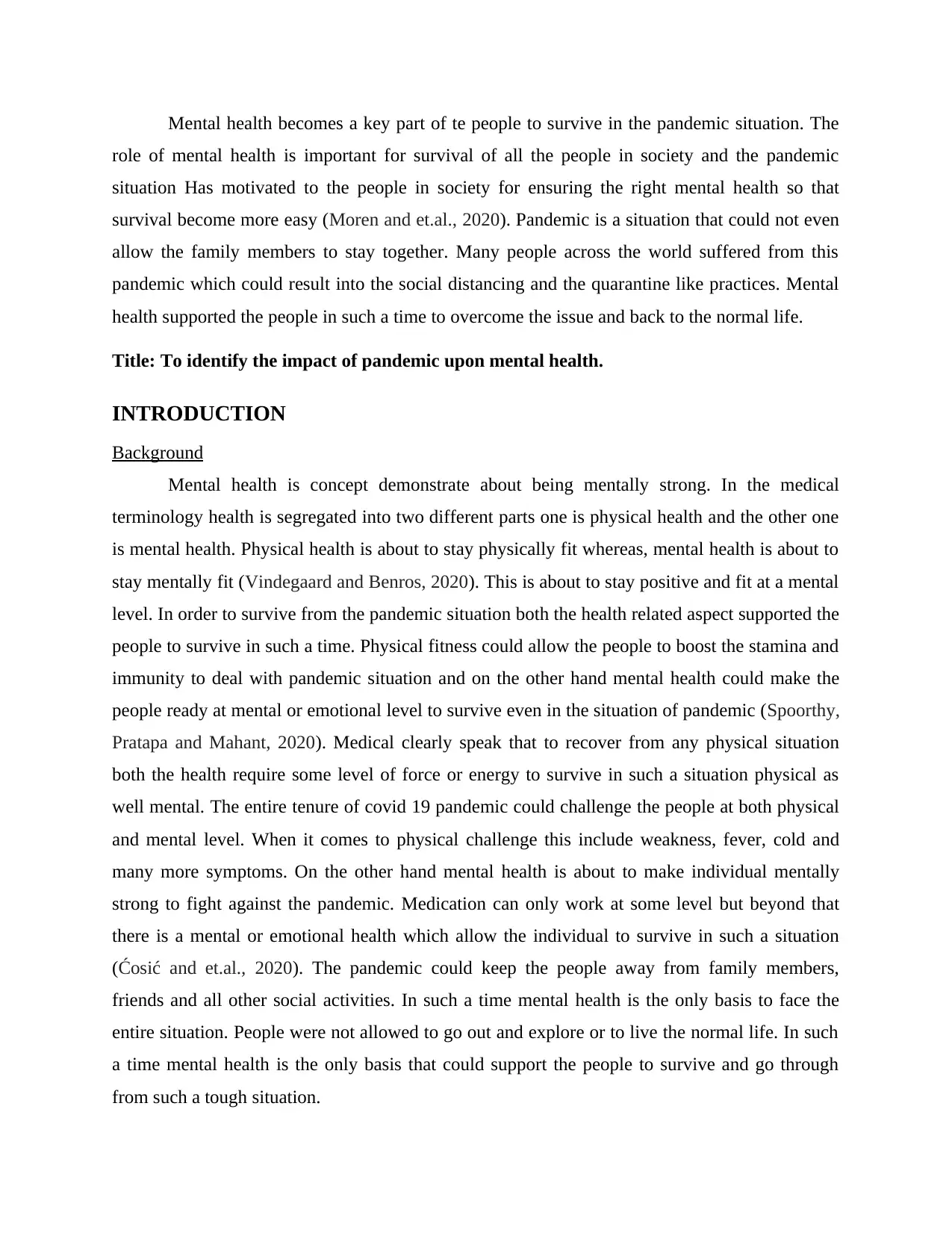
Mental health becomes a key part of te people to survive in the pandemic situation. The
role of mental health is important for survival of all the people in society and the pandemic
situation Has motivated to the people in society for ensuring the right mental health so that
survival become more easy (Moren and et.al., 2020). Pandemic is a situation that could not even
allow the family members to stay together. Many people across the world suffered from this
pandemic which could result into the social distancing and the quarantine like practices. Mental
health supported the people in such a time to overcome the issue and back to the normal life.
Title: To identify the impact of pandemic upon mental health.
INTRODUCTION
Background
Mental health is concept demonstrate about being mentally strong. In the medical
terminology health is segregated into two different parts one is physical health and the other one
is mental health. Physical health is about to stay physically fit whereas, mental health is about to
stay mentally fit (Vindegaard and Benros, 2020). This is about to stay positive and fit at a mental
level. In order to survive from the pandemic situation both the health related aspect supported the
people to survive in such a time. Physical fitness could allow the people to boost the stamina and
immunity to deal with pandemic situation and on the other hand mental health could make the
people ready at mental or emotional level to survive even in the situation of pandemic (Spoorthy,
Pratapa and Mahant, 2020). Medical clearly speak that to recover from any physical situation
both the health require some level of force or energy to survive in such a situation physical as
well mental. The entire tenure of covid 19 pandemic could challenge the people at both physical
and mental level. When it comes to physical challenge this include weakness, fever, cold and
many more symptoms. On the other hand mental health is about to make individual mentally
strong to fight against the pandemic. Medication can only work at some level but beyond that
there is a mental or emotional health which allow the individual to survive in such a situation
(Ćosić and et.al., 2020). The pandemic could keep the people away from family members,
friends and all other social activities. In such a time mental health is the only basis to face the
entire situation. People were not allowed to go out and explore or to live the normal life. In such
a time mental health is the only basis that could support the people to survive and go through
from such a tough situation.
role of mental health is important for survival of all the people in society and the pandemic
situation Has motivated to the people in society for ensuring the right mental health so that
survival become more easy (Moren and et.al., 2020). Pandemic is a situation that could not even
allow the family members to stay together. Many people across the world suffered from this
pandemic which could result into the social distancing and the quarantine like practices. Mental
health supported the people in such a time to overcome the issue and back to the normal life.
Title: To identify the impact of pandemic upon mental health.
INTRODUCTION
Background
Mental health is concept demonstrate about being mentally strong. In the medical
terminology health is segregated into two different parts one is physical health and the other one
is mental health. Physical health is about to stay physically fit whereas, mental health is about to
stay mentally fit (Vindegaard and Benros, 2020). This is about to stay positive and fit at a mental
level. In order to survive from the pandemic situation both the health related aspect supported the
people to survive in such a time. Physical fitness could allow the people to boost the stamina and
immunity to deal with pandemic situation and on the other hand mental health could make the
people ready at mental or emotional level to survive even in the situation of pandemic (Spoorthy,
Pratapa and Mahant, 2020). Medical clearly speak that to recover from any physical situation
both the health require some level of force or energy to survive in such a situation physical as
well mental. The entire tenure of covid 19 pandemic could challenge the people at both physical
and mental level. When it comes to physical challenge this include weakness, fever, cold and
many more symptoms. On the other hand mental health is about to make individual mentally
strong to fight against the pandemic. Medication can only work at some level but beyond that
there is a mental or emotional health which allow the individual to survive in such a situation
(Ćosić and et.al., 2020). The pandemic could keep the people away from family members,
friends and all other social activities. In such a time mental health is the only basis to face the
entire situation. People were not allowed to go out and explore or to live the normal life. In such
a time mental health is the only basis that could support the people to survive and go through
from such a tough situation.
⊘ This is a preview!⊘
Do you want full access?
Subscribe today to unlock all pages.

Trusted by 1+ million students worldwide
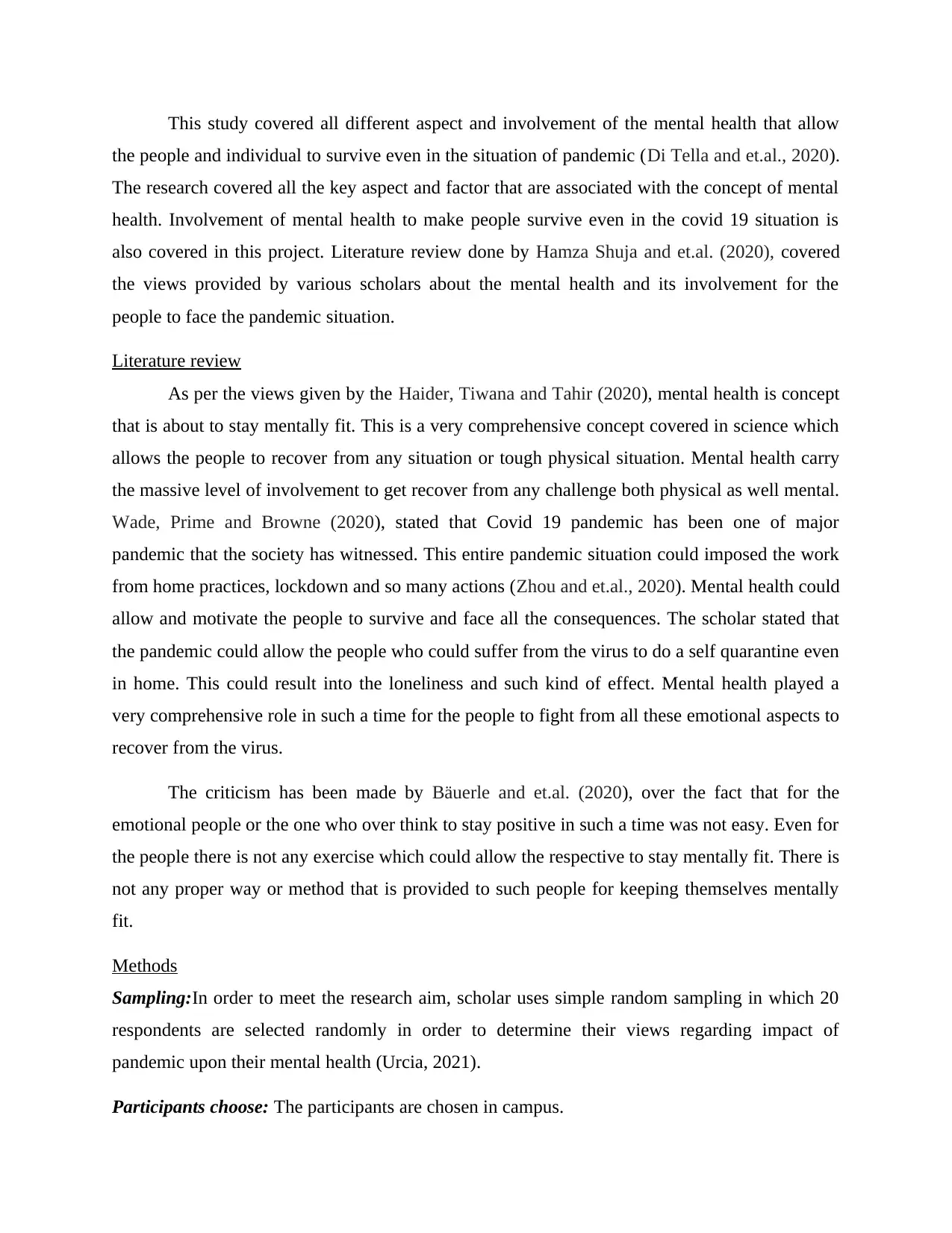
This study covered all different aspect and involvement of the mental health that allow
the people and individual to survive even in the situation of pandemic (Di Tella and et.al., 2020).
The research covered all the key aspect and factor that are associated with the concept of mental
health. Involvement of mental health to make people survive even in the covid 19 situation is
also covered in this project. Literature review done by Hamza Shuja and et.al. (2020), covered
the views provided by various scholars about the mental health and its involvement for the
people to face the pandemic situation.
Literature review
As per the views given by the Haider, Tiwana and Tahir (2020), mental health is concept
that is about to stay mentally fit. This is a very comprehensive concept covered in science which
allows the people to recover from any situation or tough physical situation. Mental health carry
the massive level of involvement to get recover from any challenge both physical as well mental.
Wade, Prime and Browne (2020), stated that Covid 19 pandemic has been one of major
pandemic that the society has witnessed. This entire pandemic situation could imposed the work
from home practices, lockdown and so many actions (Zhou and et.al., 2020). Mental health could
allow and motivate the people to survive and face all the consequences. The scholar stated that
the pandemic could allow the people who could suffer from the virus to do a self quarantine even
in home. This could result into the loneliness and such kind of effect. Mental health played a
very comprehensive role in such a time for the people to fight from all these emotional aspects to
recover from the virus.
The criticism has been made by Bäuerle and et.al. (2020), over the fact that for the
emotional people or the one who over think to stay positive in such a time was not easy. Even for
the people there is not any exercise which could allow the respective to stay mentally fit. There is
not any proper way or method that is provided to such people for keeping themselves mentally
fit.
Methods
Sampling:In order to meet the research aim, scholar uses simple random sampling in which 20
respondents are selected randomly in order to determine their views regarding impact of
pandemic upon their mental health (Urcia, 2021).
Participants choose: The participants are chosen in campus.
the people and individual to survive even in the situation of pandemic (Di Tella and et.al., 2020).
The research covered all the key aspect and factor that are associated with the concept of mental
health. Involvement of mental health to make people survive even in the covid 19 situation is
also covered in this project. Literature review done by Hamza Shuja and et.al. (2020), covered
the views provided by various scholars about the mental health and its involvement for the
people to face the pandemic situation.
Literature review
As per the views given by the Haider, Tiwana and Tahir (2020), mental health is concept
that is about to stay mentally fit. This is a very comprehensive concept covered in science which
allows the people to recover from any situation or tough physical situation. Mental health carry
the massive level of involvement to get recover from any challenge both physical as well mental.
Wade, Prime and Browne (2020), stated that Covid 19 pandemic has been one of major
pandemic that the society has witnessed. This entire pandemic situation could imposed the work
from home practices, lockdown and so many actions (Zhou and et.al., 2020). Mental health could
allow and motivate the people to survive and face all the consequences. The scholar stated that
the pandemic could allow the people who could suffer from the virus to do a self quarantine even
in home. This could result into the loneliness and such kind of effect. Mental health played a
very comprehensive role in such a time for the people to fight from all these emotional aspects to
recover from the virus.
The criticism has been made by Bäuerle and et.al. (2020), over the fact that for the
emotional people or the one who over think to stay positive in such a time was not easy. Even for
the people there is not any exercise which could allow the respective to stay mentally fit. There is
not any proper way or method that is provided to such people for keeping themselves mentally
fit.
Methods
Sampling:In order to meet the research aim, scholar uses simple random sampling in which 20
respondents are selected randomly in order to determine their views regarding impact of
pandemic upon their mental health (Urcia, 2021).
Participants choose: The participants are chosen in campus.
Paraphrase This Document
Need a fresh take? Get an instant paraphrase of this document with our AI Paraphraser
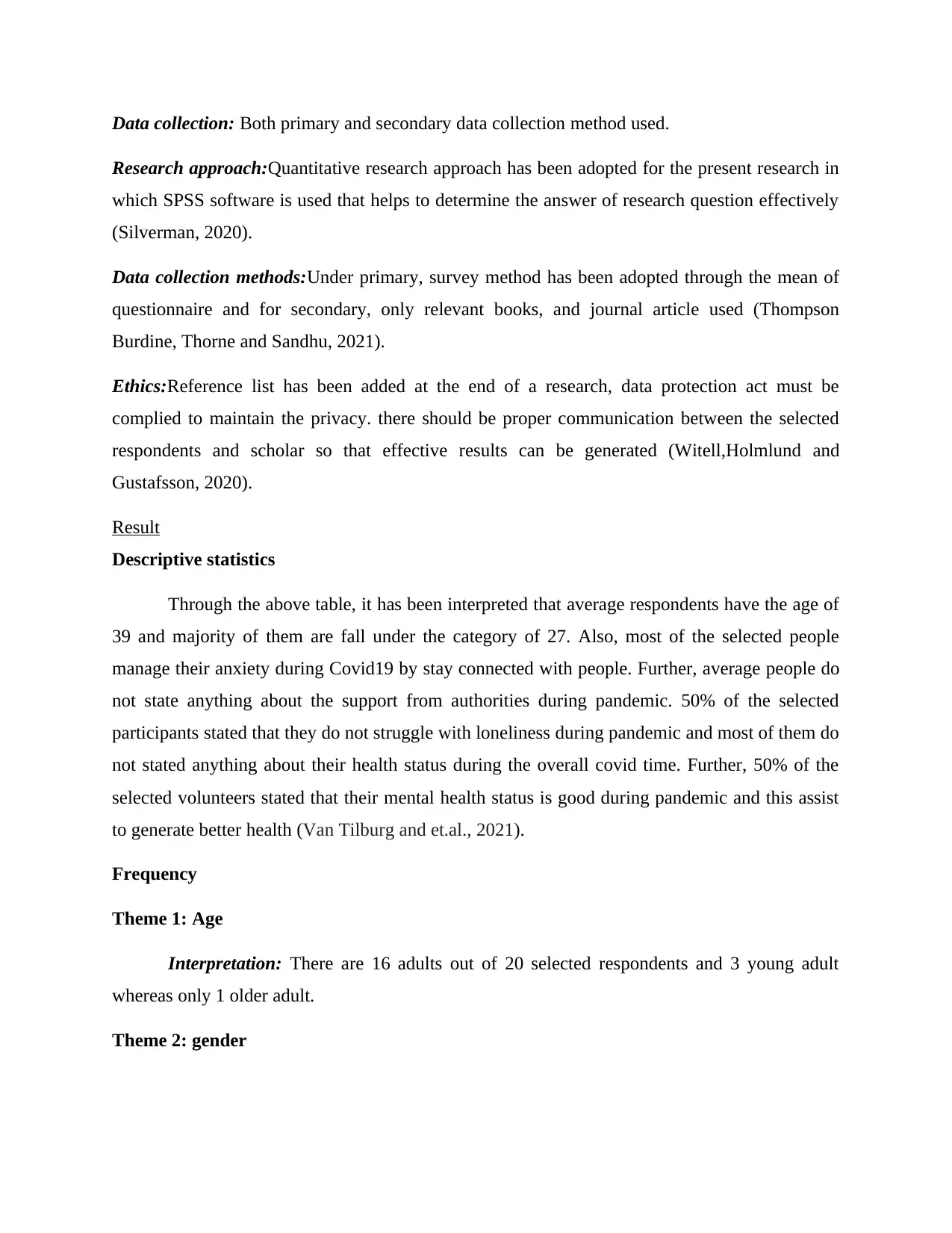
Data collection: Both primary and secondary data collection method used.
Research approach:Quantitative research approach has been adopted for the present research in
which SPSS software is used that helps to determine the answer of research question effectively
(Silverman, 2020).
Data collection methods:Under primary, survey method has been adopted through the mean of
questionnaire and for secondary, only relevant books, and journal article used (Thompson
Burdine, Thorne and Sandhu, 2021).
Ethics:Reference list has been added at the end of a research, data protection act must be
complied to maintain the privacy. there should be proper communication between the selected
respondents and scholar so that effective results can be generated (Witell,Holmlund and
Gustafsson, 2020).
Result
Descriptive statistics
Through the above table, it has been interpreted that average respondents have the age of
39 and majority of them are fall under the category of 27. Also, most of the selected people
manage their anxiety during Covid19 by stay connected with people. Further, average people do
not state anything about the support from authorities during pandemic. 50% of the selected
participants stated that they do not struggle with loneliness during pandemic and most of them do
not stated anything about their health status during the overall covid time. Further, 50% of the
selected volunteers stated that their mental health status is good during pandemic and this assist
to generate better health (Van Tilburg and et.al., 2021).
Frequency
Theme 1: Age
Interpretation: There are 16 adults out of 20 selected respondents and 3 young adult
whereas only 1 older adult.
Theme 2: gender
Research approach:Quantitative research approach has been adopted for the present research in
which SPSS software is used that helps to determine the answer of research question effectively
(Silverman, 2020).
Data collection methods:Under primary, survey method has been adopted through the mean of
questionnaire and for secondary, only relevant books, and journal article used (Thompson
Burdine, Thorne and Sandhu, 2021).
Ethics:Reference list has been added at the end of a research, data protection act must be
complied to maintain the privacy. there should be proper communication between the selected
respondents and scholar so that effective results can be generated (Witell,Holmlund and
Gustafsson, 2020).
Result
Descriptive statistics
Through the above table, it has been interpreted that average respondents have the age of
39 and majority of them are fall under the category of 27. Also, most of the selected people
manage their anxiety during Covid19 by stay connected with people. Further, average people do
not state anything about the support from authorities during pandemic. 50% of the selected
participants stated that they do not struggle with loneliness during pandemic and most of them do
not stated anything about their health status during the overall covid time. Further, 50% of the
selected volunteers stated that their mental health status is good during pandemic and this assist
to generate better health (Van Tilburg and et.al., 2021).
Frequency
Theme 1: Age
Interpretation: There are 16 adults out of 20 selected respondents and 3 young adult
whereas only 1 older adult.
Theme 2: gender
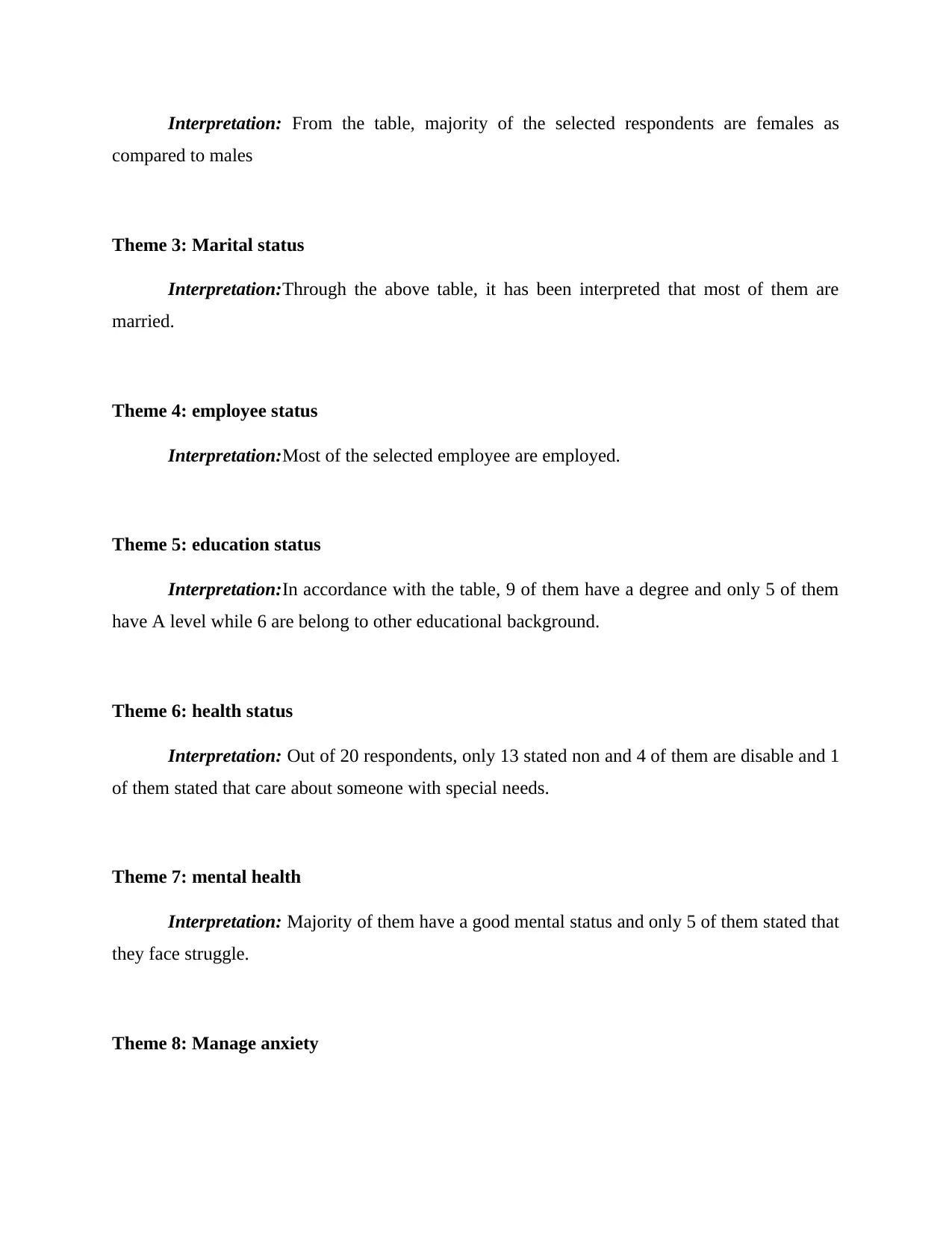
Interpretation: From the table, majority of the selected respondents are females as
compared to males
Theme 3: Marital status
Interpretation:Through the above table, it has been interpreted that most of them are
married.
Theme 4: employee status
Interpretation:Most of the selected employee are employed.
Theme 5: education status
Interpretation:In accordance with the table, 9 of them have a degree and only 5 of them
have A level while 6 are belong to other educational background.
Theme 6: health status
Interpretation: Out of 20 respondents, only 13 stated non and 4 of them are disable and 1
of them stated that care about someone with special needs.
Theme 7: mental health
Interpretation: Majority of them have a good mental status and only 5 of them stated that
they face struggle.
Theme 8: Manage anxiety
compared to males
Theme 3: Marital status
Interpretation:Through the above table, it has been interpreted that most of them are
married.
Theme 4: employee status
Interpretation:Most of the selected employee are employed.
Theme 5: education status
Interpretation:In accordance with the table, 9 of them have a degree and only 5 of them
have A level while 6 are belong to other educational background.
Theme 6: health status
Interpretation: Out of 20 respondents, only 13 stated non and 4 of them are disable and 1
of them stated that care about someone with special needs.
Theme 7: mental health
Interpretation: Majority of them have a good mental status and only 5 of them stated that
they face struggle.
Theme 8: Manage anxiety
⊘ This is a preview!⊘
Do you want full access?
Subscribe today to unlock all pages.

Trusted by 1+ million students worldwide
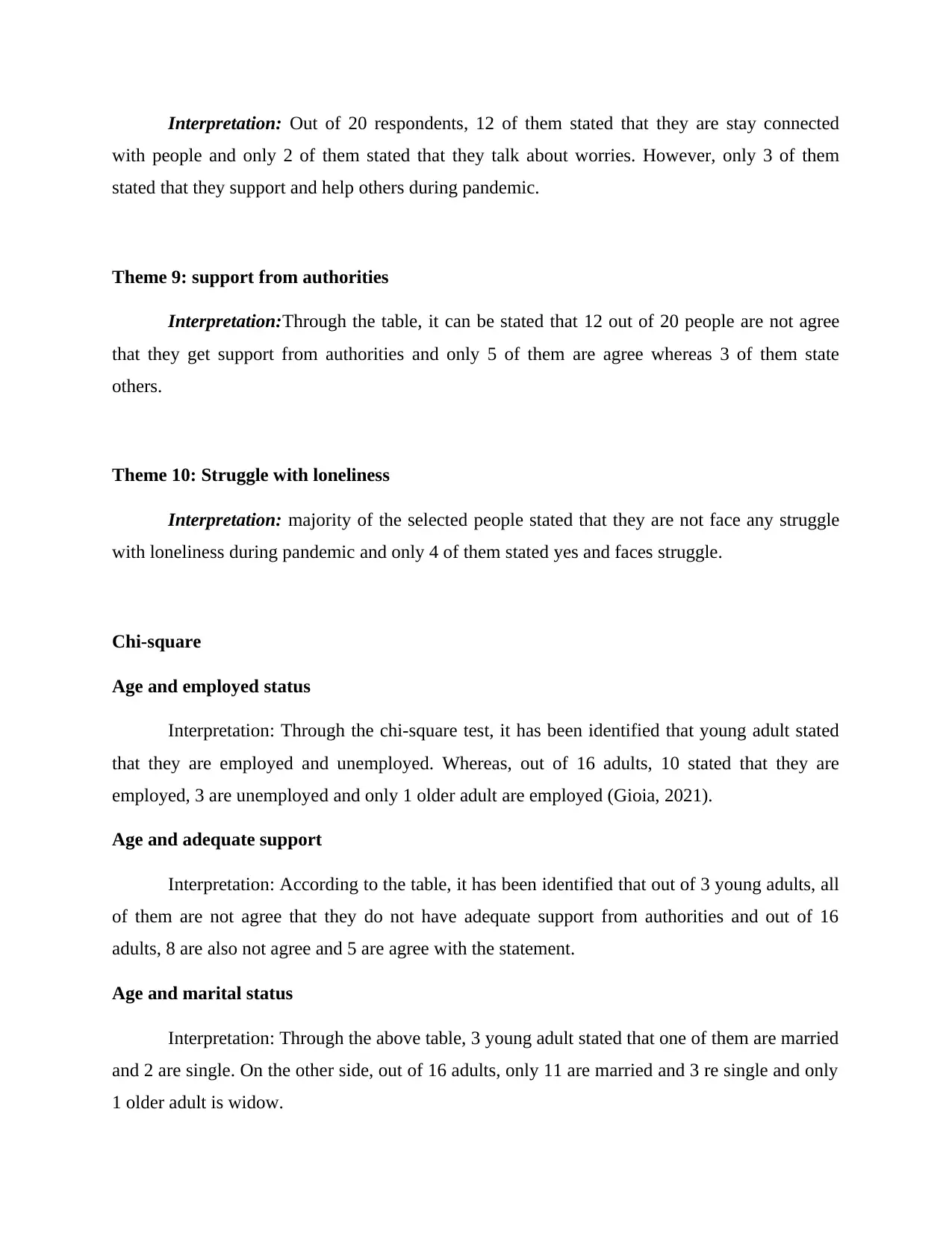
Interpretation: Out of 20 respondents, 12 of them stated that they are stay connected
with people and only 2 of them stated that they talk about worries. However, only 3 of them
stated that they support and help others during pandemic.
Theme 9: support from authorities
Interpretation:Through the table, it can be stated that 12 out of 20 people are not agree
that they get support from authorities and only 5 of them are agree whereas 3 of them state
others.
Theme 10: Struggle with loneliness
Interpretation: majority of the selected people stated that they are not face any struggle
with loneliness during pandemic and only 4 of them stated yes and faces struggle.
Chi-square
Age and employed status
Interpretation: Through the chi-square test, it has been identified that young adult stated
that they are employed and unemployed. Whereas, out of 16 adults, 10 stated that they are
employed, 3 are unemployed and only 1 older adult are employed (Gioia, 2021).
Age and adequate support
Interpretation: According to the table, it has been identified that out of 3 young adults, all
of them are not agree that they do not have adequate support from authorities and out of 16
adults, 8 are also not agree and 5 are agree with the statement.
Age and marital status
Interpretation: Through the above table, 3 young adult stated that one of them are married
and 2 are single. On the other side, out of 16 adults, only 11 are married and 3 re single and only
1 older adult is widow.
with people and only 2 of them stated that they talk about worries. However, only 3 of them
stated that they support and help others during pandemic.
Theme 9: support from authorities
Interpretation:Through the table, it can be stated that 12 out of 20 people are not agree
that they get support from authorities and only 5 of them are agree whereas 3 of them state
others.
Theme 10: Struggle with loneliness
Interpretation: majority of the selected people stated that they are not face any struggle
with loneliness during pandemic and only 4 of them stated yes and faces struggle.
Chi-square
Age and employed status
Interpretation: Through the chi-square test, it has been identified that young adult stated
that they are employed and unemployed. Whereas, out of 16 adults, 10 stated that they are
employed, 3 are unemployed and only 1 older adult are employed (Gioia, 2021).
Age and adequate support
Interpretation: According to the table, it has been identified that out of 3 young adults, all
of them are not agree that they do not have adequate support from authorities and out of 16
adults, 8 are also not agree and 5 are agree with the statement.
Age and marital status
Interpretation: Through the above table, 3 young adult stated that one of them are married
and 2 are single. On the other side, out of 16 adults, only 11 are married and 3 re single and only
1 older adult is widow.
Paraphrase This Document
Need a fresh take? Get an instant paraphrase of this document with our AI Paraphraser
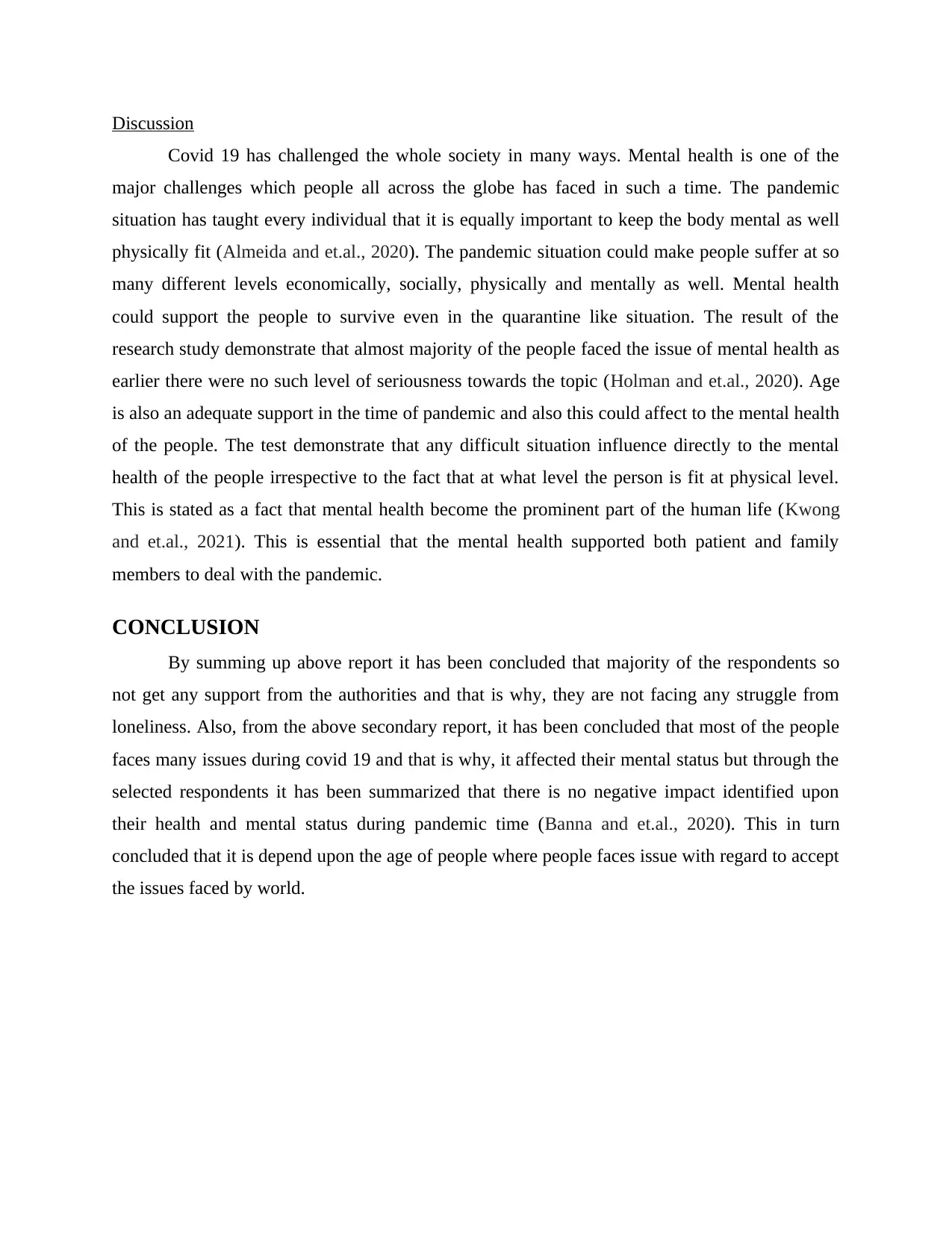
Discussion
Covid 19 has challenged the whole society in many ways. Mental health is one of the
major challenges which people all across the globe has faced in such a time. The pandemic
situation has taught every individual that it is equally important to keep the body mental as well
physically fit (Almeida and et.al., 2020). The pandemic situation could make people suffer at so
many different levels economically, socially, physically and mentally as well. Mental health
could support the people to survive even in the quarantine like situation. The result of the
research study demonstrate that almost majority of the people faced the issue of mental health as
earlier there were no such level of seriousness towards the topic (Holman and et.al., 2020). Age
is also an adequate support in the time of pandemic and also this could affect to the mental health
of the people. The test demonstrate that any difficult situation influence directly to the mental
health of the people irrespective to the fact that at what level the person is fit at physical level.
This is stated as a fact that mental health become the prominent part of the human life (Kwong
and et.al., 2021). This is essential that the mental health supported both patient and family
members to deal with the pandemic.
CONCLUSION
By summing up above report it has been concluded that majority of the respondents so
not get any support from the authorities and that is why, they are not facing any struggle from
loneliness. Also, from the above secondary report, it has been concluded that most of the people
faces many issues during covid 19 and that is why, it affected their mental status but through the
selected respondents it has been summarized that there is no negative impact identified upon
their health and mental status during pandemic time (Banna and et.al., 2020). This in turn
concluded that it is depend upon the age of people where people faces issue with regard to accept
the issues faced by world.
Covid 19 has challenged the whole society in many ways. Mental health is one of the
major challenges which people all across the globe has faced in such a time. The pandemic
situation has taught every individual that it is equally important to keep the body mental as well
physically fit (Almeida and et.al., 2020). The pandemic situation could make people suffer at so
many different levels economically, socially, physically and mentally as well. Mental health
could support the people to survive even in the quarantine like situation. The result of the
research study demonstrate that almost majority of the people faced the issue of mental health as
earlier there were no such level of seriousness towards the topic (Holman and et.al., 2020). Age
is also an adequate support in the time of pandemic and also this could affect to the mental health
of the people. The test demonstrate that any difficult situation influence directly to the mental
health of the people irrespective to the fact that at what level the person is fit at physical level.
This is stated as a fact that mental health become the prominent part of the human life (Kwong
and et.al., 2021). This is essential that the mental health supported both patient and family
members to deal with the pandemic.
CONCLUSION
By summing up above report it has been concluded that majority of the respondents so
not get any support from the authorities and that is why, they are not facing any struggle from
loneliness. Also, from the above secondary report, it has been concluded that most of the people
faces many issues during covid 19 and that is why, it affected their mental status but through the
selected respondents it has been summarized that there is no negative impact identified upon
their health and mental status during pandemic time (Banna and et.al., 2020). This in turn
concluded that it is depend upon the age of people where people faces issue with regard to accept
the issues faced by world.
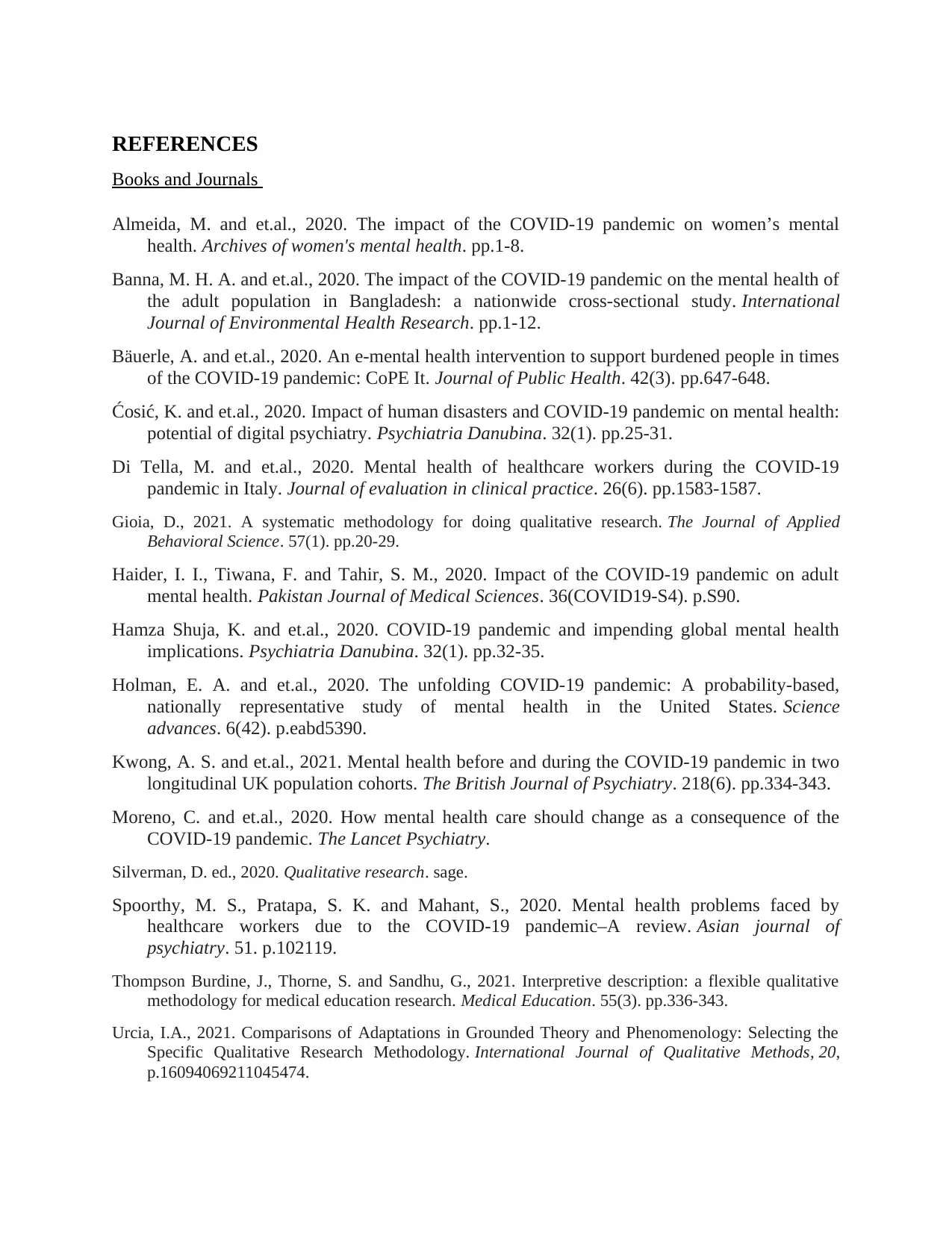
REFERENCES
Books and Journals
Almeida, M. and et.al., 2020. The impact of the COVID-19 pandemic on women’s mental
health. Archives of women's mental health. pp.1-8.
Banna, M. H. A. and et.al., 2020. The impact of the COVID-19 pandemic on the mental health of
the adult population in Bangladesh: a nationwide cross-sectional study. International
Journal of Environmental Health Research. pp.1-12.
Bäuerle, A. and et.al., 2020. An e-mental health intervention to support burdened people in times
of the COVID-19 pandemic: CoPE It. Journal of Public Health. 42(3). pp.647-648.
Ćosić, K. and et.al., 2020. Impact of human disasters and COVID-19 pandemic on mental health:
potential of digital psychiatry. Psychiatria Danubina. 32(1). pp.25-31.
Di Tella, M. and et.al., 2020. Mental health of healthcare workers during the COVID‐19
pandemic in Italy. Journal of evaluation in clinical practice. 26(6). pp.1583-1587.
Gioia, D., 2021. A systematic methodology for doing qualitative research. The Journal of Applied
Behavioral Science. 57(1). pp.20-29.
Haider, I. I., Tiwana, F. and Tahir, S. M., 2020. Impact of the COVID-19 pandemic on adult
mental health. Pakistan Journal of Medical Sciences. 36(COVID19-S4). p.S90.
Hamza Shuja, K. and et.al., 2020. COVID-19 pandemic and impending global mental health
implications. Psychiatria Danubina. 32(1). pp.32-35.
Holman, E. A. and et.al., 2020. The unfolding COVID-19 pandemic: A probability-based,
nationally representative study of mental health in the United States. Science
advances. 6(42). p.eabd5390.
Kwong, A. S. and et.al., 2021. Mental health before and during the COVID-19 pandemic in two
longitudinal UK population cohorts. The British Journal of Psychiatry. 218(6). pp.334-343.
Moreno, C. and et.al., 2020. How mental health care should change as a consequence of the
COVID-19 pandemic. The Lancet Psychiatry.
Silverman, D. ed., 2020. Qualitative research. sage.
Spoorthy, M. S., Pratapa, S. K. and Mahant, S., 2020. Mental health problems faced by
healthcare workers due to the COVID-19 pandemic–A review. Asian journal of
psychiatry. 51. p.102119.
Thompson Burdine, J., Thorne, S. and Sandhu, G., 2021. Interpretive description: a flexible qualitative
methodology for medical education research. Medical Education. 55(3). pp.336-343.
Urcia, I.A., 2021. Comparisons of Adaptations in Grounded Theory and Phenomenology: Selecting the
Specific Qualitative Research Methodology. International Journal of Qualitative Methods, 20,
p.16094069211045474.
Books and Journals
Almeida, M. and et.al., 2020. The impact of the COVID-19 pandemic on women’s mental
health. Archives of women's mental health. pp.1-8.
Banna, M. H. A. and et.al., 2020. The impact of the COVID-19 pandemic on the mental health of
the adult population in Bangladesh: a nationwide cross-sectional study. International
Journal of Environmental Health Research. pp.1-12.
Bäuerle, A. and et.al., 2020. An e-mental health intervention to support burdened people in times
of the COVID-19 pandemic: CoPE It. Journal of Public Health. 42(3). pp.647-648.
Ćosić, K. and et.al., 2020. Impact of human disasters and COVID-19 pandemic on mental health:
potential of digital psychiatry. Psychiatria Danubina. 32(1). pp.25-31.
Di Tella, M. and et.al., 2020. Mental health of healthcare workers during the COVID‐19
pandemic in Italy. Journal of evaluation in clinical practice. 26(6). pp.1583-1587.
Gioia, D., 2021. A systematic methodology for doing qualitative research. The Journal of Applied
Behavioral Science. 57(1). pp.20-29.
Haider, I. I., Tiwana, F. and Tahir, S. M., 2020. Impact of the COVID-19 pandemic on adult
mental health. Pakistan Journal of Medical Sciences. 36(COVID19-S4). p.S90.
Hamza Shuja, K. and et.al., 2020. COVID-19 pandemic and impending global mental health
implications. Psychiatria Danubina. 32(1). pp.32-35.
Holman, E. A. and et.al., 2020. The unfolding COVID-19 pandemic: A probability-based,
nationally representative study of mental health in the United States. Science
advances. 6(42). p.eabd5390.
Kwong, A. S. and et.al., 2021. Mental health before and during the COVID-19 pandemic in two
longitudinal UK population cohorts. The British Journal of Psychiatry. 218(6). pp.334-343.
Moreno, C. and et.al., 2020. How mental health care should change as a consequence of the
COVID-19 pandemic. The Lancet Psychiatry.
Silverman, D. ed., 2020. Qualitative research. sage.
Spoorthy, M. S., Pratapa, S. K. and Mahant, S., 2020. Mental health problems faced by
healthcare workers due to the COVID-19 pandemic–A review. Asian journal of
psychiatry. 51. p.102119.
Thompson Burdine, J., Thorne, S. and Sandhu, G., 2021. Interpretive description: a flexible qualitative
methodology for medical education research. Medical Education. 55(3). pp.336-343.
Urcia, I.A., 2021. Comparisons of Adaptations in Grounded Theory and Phenomenology: Selecting the
Specific Qualitative Research Methodology. International Journal of Qualitative Methods, 20,
p.16094069211045474.
⊘ This is a preview!⊘
Do you want full access?
Subscribe today to unlock all pages.

Trusted by 1+ million students worldwide
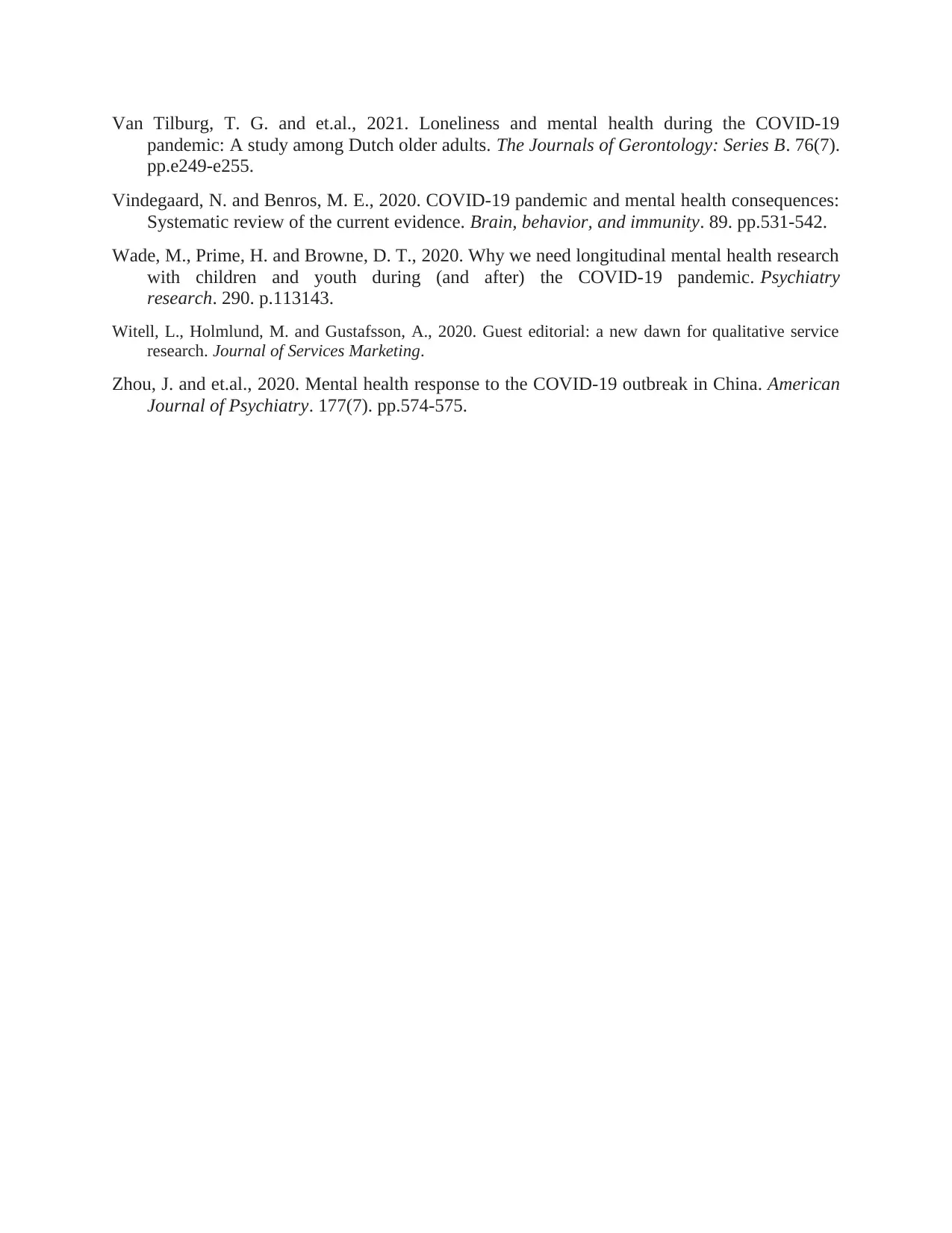
Van Tilburg, T. G. and et.al., 2021. Loneliness and mental health during the COVID-19
pandemic: A study among Dutch older adults. The Journals of Gerontology: Series B. 76(7).
pp.e249-e255.
Vindegaard, N. and Benros, M. E., 2020. COVID-19 pandemic and mental health consequences:
Systematic review of the current evidence. Brain, behavior, and immunity. 89. pp.531-542.
Wade, M., Prime, H. and Browne, D. T., 2020. Why we need longitudinal mental health research
with children and youth during (and after) the COVID-19 pandemic. Psychiatry
research. 290. p.113143.
Witell, L., Holmlund, M. and Gustafsson, A., 2020. Guest editorial: a new dawn for qualitative service
research. Journal of Services Marketing.
Zhou, J. and et.al., 2020. Mental health response to the COVID-19 outbreak in China. American
Journal of Psychiatry. 177(7). pp.574-575.
pandemic: A study among Dutch older adults. The Journals of Gerontology: Series B. 76(7).
pp.e249-e255.
Vindegaard, N. and Benros, M. E., 2020. COVID-19 pandemic and mental health consequences:
Systematic review of the current evidence. Brain, behavior, and immunity. 89. pp.531-542.
Wade, M., Prime, H. and Browne, D. T., 2020. Why we need longitudinal mental health research
with children and youth during (and after) the COVID-19 pandemic. Psychiatry
research. 290. p.113143.
Witell, L., Holmlund, M. and Gustafsson, A., 2020. Guest editorial: a new dawn for qualitative service
research. Journal of Services Marketing.
Zhou, J. and et.al., 2020. Mental health response to the COVID-19 outbreak in China. American
Journal of Psychiatry. 177(7). pp.574-575.
1 out of 10
Related Documents
Your All-in-One AI-Powered Toolkit for Academic Success.
+13062052269
info@desklib.com
Available 24*7 on WhatsApp / Email
![[object Object]](/_next/static/media/star-bottom.7253800d.svg)
Unlock your academic potential
Copyright © 2020–2025 A2Z Services. All Rights Reserved. Developed and managed by ZUCOL.





